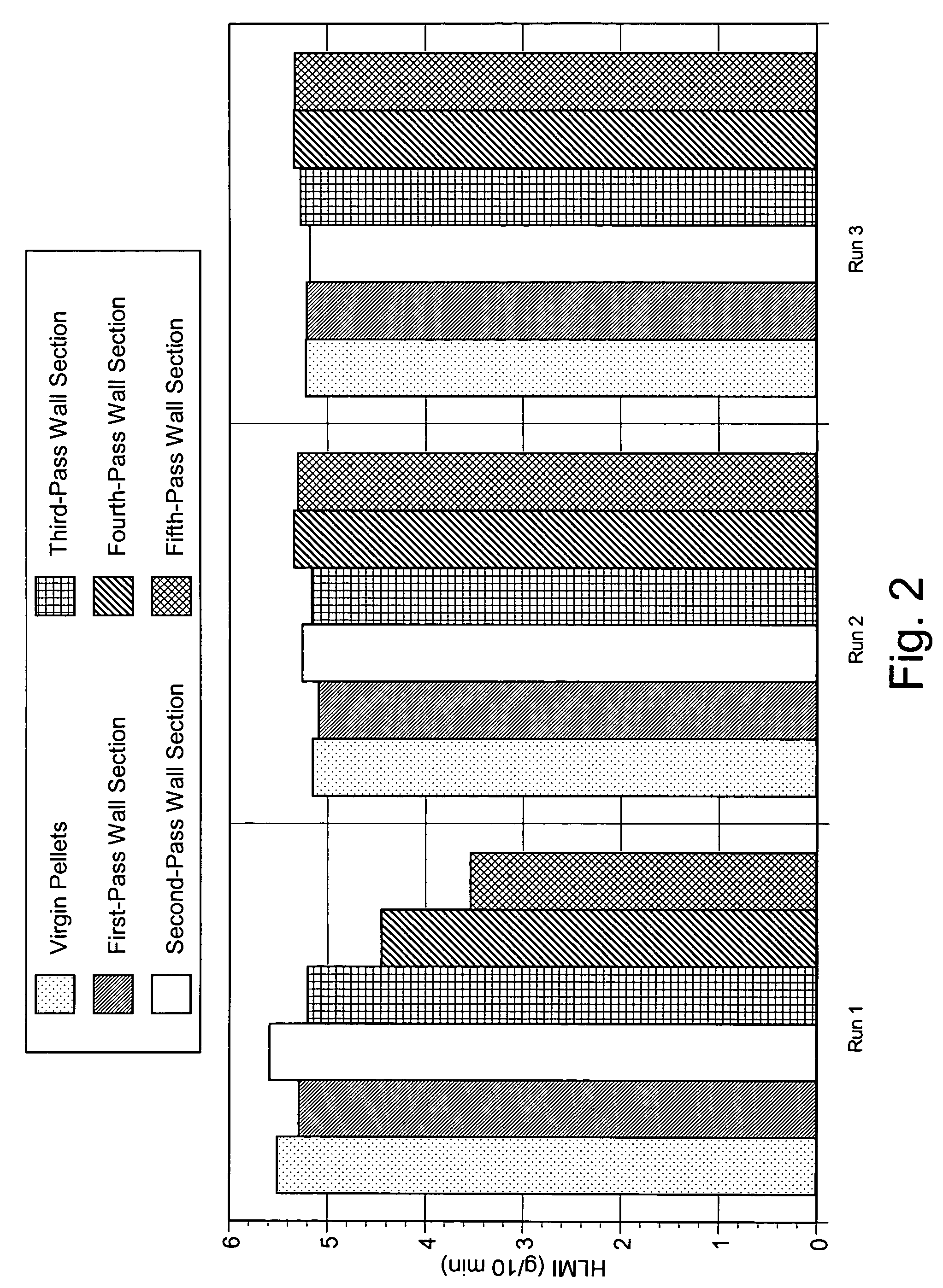Phosphite additives in polyolefins
a polyolefin and additive technology, applied in the field of polyolefins, can solve the problems of polymer deformation, loss of impact strength, polymer deformation, etc., and achieve the effect of improving color and stability
- Summary
- Abstract
- Description
- Claims
- Application Information
AI Technical Summary
Benefits of technology
Problems solved by technology
Method used
Image
Examples
examples
[0282]The following examples are provided to assist a person skilled in the art with further understanding of this invention. These examples are intended to be illustrative of the invention but are not meant to be construed as limiting the reasonable scope of the invention.
[0283]Chemical compounds utilized in these examples are summarized below:
[0284]A. bis(2,4-dicumylphenyl)pentaerythritol diphosphite (CAS No. 154862-43-8), commercially available as Doverphos® S-9228, which is a registered trademark of Dover Chemical Company. Doverphos® 9960C is 95 wt. % Doverphos® S-9228T and 5 wt. % DHT-4A. Doverphos® S-9228T is 99 wt. % Doverphoso S-9228 and 1 wt. % TIPA;
[0285]B. bis(2,4-di-t-butylphenyl)pentaerythritol diphosphite (CAS No. 26741-53-7), commercially available as Ultranox® 626, which is a registered trademark of General Electric Co.;
[0286]C. bis(2,6-di-tert-butyl,4-methylphenyl)pentaerythritol diphosphite (CAS No. 80693-00-1), commercially available as PEP-36, which is a register...
examples 1 – 6
Examples 1–6
[0338]The following compositions were prepared and evaluated as described above.
[0339]
Run NumberAdditiveAmount in Composition (wt. %)1Irganox 10100.07Doverphos S-92280.10DHT-4A0.012Irganox 10100.07Doverphos 9960C0.05Irgafos 1680.053Irganox 10100.07Ultranox 627A0.05Irgafos 1680.054Irganox 10100.07Doverphos S-92280.10DHT-4A0.01UV Concentrate1.005Irganox 10100.07Doverphos 9960C0.05Irgafos 1680.05UV Concentrate1.006Irganox 10100.07Ultranox 627A0.05Irgafos 1680.05UV Concentrate1.00
[0340]The effects of regrind or multi-pass on various physical properties were evaluated. The results of these evaluations are reported in FIGS. 1–20. As indicated in these figures, the compositions made in accordance with the present invention showed improved and / or enhanced stability. The effects of the addition of a UV concentrate or stabilizer on the PE # was evaluated and reported in FIG. 21. As indicated, compositions made in accordance with the present invention showed improved color stabilit...
examples 7 – 12
Examples 7–12
[0341]The following compositions were prepared and evaluated as described above. Run 1 was employed as a control composition for comparison to Runs 7–9, and Run 4 was employed as a control composition for comparison to Runs 10–12.
[0342]
Run NumberAdditiveAmount in Composition (wt. %)7Irganox 10100.07Doverphos S-92280.10DHT-4A0.018Irganox 10100.07Doverphos S-92280.05Irgafos 1680.05DHT-4A0.019Irganox 10100.05Irgafos 1680.1510Irganox 10100.07Doverphos S-92280.10DHT-4A0.01UV Concentrate1.0011Irganox 10100.07Doverphos S-92280.05Irgafos 1680.05DHT-4A0.01UV Concentrate1.0012Irganox 10100.05Irgafos 1680.15UV Concentrate1.00
[0343]The effects of regrind or multi-pass on various physical properties were evaluated. The results of these evaluations are reported in FIGS. 22–29. As indicated in these figures, the compositions made in accordance with the present invention showed improved and / or enhanced stability. The effects of the addition of a UV concentrate or stabilizer on the PE #...
PUM
| Property | Measurement | Unit |
|---|---|---|
| concentration | aaaaa | aaaaa |
| concentration | aaaaa | aaaaa |
| temperature | aaaaa | aaaaa |
Abstract
Description
Claims
Application Information
 Login to View More
Login to View More - R&D
- Intellectual Property
- Life Sciences
- Materials
- Tech Scout
- Unparalleled Data Quality
- Higher Quality Content
- 60% Fewer Hallucinations
Browse by: Latest US Patents, China's latest patents, Technical Efficacy Thesaurus, Application Domain, Technology Topic, Popular Technical Reports.
© 2025 PatSnap. All rights reserved.Legal|Privacy policy|Modern Slavery Act Transparency Statement|Sitemap|About US| Contact US: help@patsnap.com



